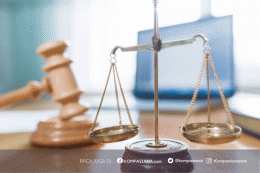Such policies align with the principle of constitutional morality (Bickel, 1962), namely the belief that public officials and citizens must prioritize respect for the spirit of the constitution, rather than simply exploiting legal loopholes for personal gain. In the context of Pancasila democracy, this means maintaining the honor of the state as the primary goal of every political and legal action.
If these principles are ignored , the long-term consequence will be the normalization of behavior that undermines the state's authority. Pardon recipients could set a bad precedent for future generations of politicians, where the president's prerogative is viewed as a personal negotiating tool, and judges' decisions are seen as mere opinions that can be challenged at will.
Thus, the legal consequences of suing a judge after receiving an abolition are not limited to the failure of the lawsuit or potential criminal penalties, but also encompass broader damage to the legal and moral order of the country. Ultimately, upholding the honor of state institutions is not merely a legal obligation, but also a moral mandate that must be upheld by every citizen who claims to love this Republic.
Conclusion
In Pancasila democracy, the president's prerogative to grant amnesty or abolition is a manifestation of constitutional wisdom aimed at maintaining national harmony. This authority falls within the realm of legal politics, while judges' decisions fall within the independent judicial realm. These two realms are not meant to be in conflict, but rather to complement each other to uphold substantive justice.
If someone has received abolition or amnesty, the ethical and legal consequences include respect for the two institutions involved: the executive and the judiciary. Accepting a state pardon is a sign that the state has given a second chance, and the appropriate attitude is gratitude, not using it as a springboard to attack the judge who ruled on the case. The opposite attitude is not only ungrateful but can be categorized as an abuse of rights ---a misuse of rights that undermines the integrity of the legal system.
The political philosophy of Pancasila emphasizes the balance between individual freedom and collective interests. Notonagoro (1975) emphasized that Pancasila embodies the value of harmony, not ego dominance. Within this framework, politicians and public officials must maintain a sense of unity and a mystical sense of national consciousness ---that is, the awareness that individual actions have implications for the sustainability of the nation as a whole.
Mystical national consciousness is a form of awareness that transcends pragmatic political calculations. It demands that leaders and citizens view the nation's interests as a binding "spirit," as embodied in the Volksgeist concept in Friedrich Carl von Savigny's legal theory, that laws and public actions must stem from the soul of the nation (Savigny, 1840/1979). With this awareness, a recipient of abolition who is truly convinced of their innocence should reject the grant and continue their resistance through purely legal channels, in order to maintain their dignity and the authority of the state.
If someone accepts a pardon and then sues the judge, they send a morally ambiguous signal: accepting a pardon seems to acknowledge the legitimacy of the decision, but then rejecting it through a lawsuit. This is not only contradictory from a legal standpoint but also undermines the state's institutional order. At this point, such action can be seen as an affront to the constitution, as it exploits state mechanisms for personal gain without respecting the integrity of inter-institutional functions.
Pancasila democracy differs from liberal-capitalist democracy like that in the United States. In liberal democracy, individualistic politicians can operate based on personal profit-and-loss calculations, as long as they do not violate positive law. However, in Pancasila democracy, political individualism that negates collective consciousness is a form of ideological deviation. Here, politics is not simply a competition for power, but rather a practice of devotion tied to the mystical ideal of independence---"freedom to be united, sovereign, just, and prosperous" (Sukarno, 1960).
For leaders loyal to Pancasila, state pardon is not a loophole to attack opponents, but an opportunity to rebuild public trust. This awareness demands political maturity: either accept the pardon with gratitude, or firmly reject it out of principle and pure self-defense. Both choices are honorable, provided they are consistent; what is dishonorable is accepting pardon while using it as a political weapon of revenge.
As a solution, ethical regulations for state pardon recipients should be considered. These regulations could include norms prohibiting amnesty or abolition recipients from attacking judges based on their decisions, unless there is strong evidence of ethical violations or judicial corruption. The goal is not to restrict citizens' freedoms, but to ensure that the President's prerogative is not used as a tool for inter-institutional conflict.







